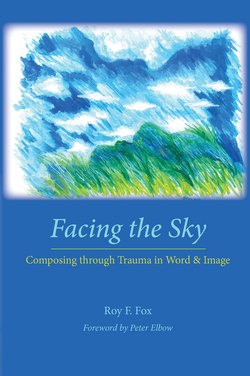Читать книгу Facing the Sky - Roy F. Fox - Страница 3
На сайте Литреса книга снята с продажи.
ОглавлениеPraise for Facing the Sky
More than a poultice for the psyche, Facing the Sky shows how composing in words and images mitigates trauma, heals on multiple levels, and makes us better functioning humans, as well as more deeply humane. This book demonstrates that when we nurture the voice we nurture the world and shows us how. It is a book for all of us who must sometime, somewhere, at some critical moment hold another’s soul in our hands. Read. Reap.
—Susan Hudson, Boise, Idaho
For teachers and future teachers of writing, Facing the Sky is an invaluable resource. By refocusing our attention on the role personal narrative plays in our lives, Fox encourages us to consider seriously what roles the “painfully honest” can, and should, play in our classrooms. Fox’s research reminds us of the necessity for our writing classrooms to be sites of emotional inquiry, catharsis, and community-building. This book asks us to consider how critical thinking and written fluency can be fostered when we give language to the images associated with trauma. In the process, Fox proposes a pedagogy concerned with and deriving from the very humanity of our students.
—Benjamin Batzer, University of Iowa
Roy Fox’s Facing the Sky: Composing through Trauma in Word and Image is an eloquent and timely homage to the power of expressive writing as a way to heal. This alone would be good reason to love this book, especially since Fox isn’t content with simply showing how word and image can be transformative; he also examines why this is so, and in the process we come to see the qualities of personal narratives that yield the most meaning for a writer, and in turn, provide teachers of writing with the tools to teach them. Facing the Sky makes the courageous claim that we should invite students to write about trauma, and not simply because it might help them to feel better but because it teaches them things about writing that they might not learn as well any other way. Drawing on cases studies, Fox charts the moves that experienced writers make as they use their expertise to go from recording their losses to making meaning from them. These are exactly the kind of intellectual practices that animate any act of inquiry. But here the writers are deeply motivated and especially receptive to seeing the ways language and image can be deployed in discovery. Whether it’s Kate trying to come to terms with the sudden death of her husband, or Lucy confronting breast cancer, each writer is inspired by her faith in writing as a way of discovering what she didn’t know she knew. But it’s a process that involves zigs and zags, and part of the drama of Facing the Sky is witnessing each writer switch between public and private writing, and even between genres, as she attempts to find the stories that yield understanding. Facing the Sky is an especially timely and welcome contribution to the conversation about the importance of narrative in writing instruction. It’s a book that challenges the Common Core’s diminishment of narrative writing as little more than a “technique.” On the contrary, Fox shows that it is a powerful method of analysis and reasoning that also bears the priceless gift of self-knowledge.
—Bruce Ballenger, author of The Curious Researcher and The Curious Writer
